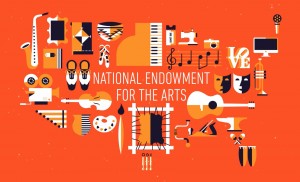by Colorado Review Associate Editor Meghan Pipe
 Today in a literature class on postmodernism—I am the teaching assistant in this upper-level course for undergraduates—we got to talking about politics in art, and whether that P-word should have a place in art at all. One student suggested that art should come from individual experience and not politics, as though politics happens someplace separate from our lives. The student’s opinion, which you can probably sense is colored with the bias of my disagreement in the retelling, was that politics dirties the idea of art for art’s sake. I believe, instead, that politics touches every part of our lived experiences, regardless of the country in which we live, and so we can’t help but make political statements via the things we choose to explore (or not explore) in our art. To be ignorant of that, or to avoid examining one’s position in a political world, is a political statement in itself.
Today in a literature class on postmodernism—I am the teaching assistant in this upper-level course for undergraduates—we got to talking about politics in art, and whether that P-word should have a place in art at all. One student suggested that art should come from individual experience and not politics, as though politics happens someplace separate from our lives. The student’s opinion, which you can probably sense is colored with the bias of my disagreement in the retelling, was that politics dirties the idea of art for art’s sake. I believe, instead, that politics touches every part of our lived experiences, regardless of the country in which we live, and so we can’t help but make political statements via the things we choose to explore (or not explore) in our art. To be ignorant of that, or to avoid examining one’s position in a political world, is a political statement in itself.
Beyond art’s content, the possibility of its creation is full of political significance, too. As writers reading and submitting to literary magazines, we hope to have our work published. Though we hope to get paid for it too, we know that writing is ultimately not a moneymaking enterprise. Who, then, can afford to write? The decision to participate in art becomes more difficult for writers without safety nets—without the cushion of a generous family member or a spouse who works full-time. It would be nice to think of writing and art as apolitical affairs, as statements about our lived experiences that have nothing to do with power and money and the structures that govern us. But I just don’t think that’s true.
Here, then, is the worry I’ve been trying to circle in on: What happens if the National Endowments for the Arts (NEA) is eliminated by the current administration? What happens if funding for arts organizations is cut? Access to the arts is already skewed by one’s circumstances. The NEA funds individual artists and arts organizations that seek to widen that access in countless ways and, without such funding, I’m afraid the choice to be an artist will feel less available or possible, especially to voices already marginalized in this country.
There are things we can do to advocate for ourselves as writer/artists, and for the organizations funded by the NEA that make our writing lives—really, everyone’s lives, artist or not—richer. Arts Advocacy Day is next month, and beyond the gathering in Washington, DC, there’s probably something being planned in your state, too. Arts for Colorado, for instance, will host an advocacy day on March 8th, where you can receive training on how to speak to your legislator before meeting with them. You can also volunteer at an arts organization you love—maybe a community writing and tutoring center near you needs teaching artists or tutors to work with budding writers. Or you can subscribe to the nonprofit literary magazines you most love, financially supporting the work they do (yes, I’ve written about this before!). And finally, you can have conversations with your community about the links between politics, money, and art. They exist. They affect our literary landscape. And we need to be vocal about them.